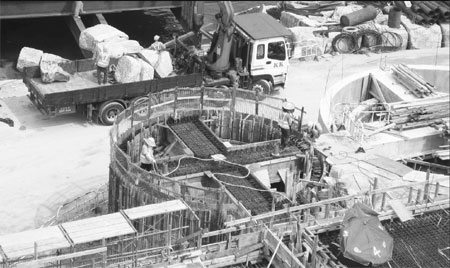City's firm plans waste to biodiesel biz model
Updated: 2012-08-02 06:55
By Li Tao(HK Edition)
|
|||||||||
|
A waste water treatment plant, part of ASB's biodiesel factory, is under construction in Tseung Kwan O. The firm aims to roll out the biz to mainland if the model succeeds. Provided to China Daily |
ASB Biodiesel (Hong Kong) Ltd, which is setting up a plant to produce biodiesel through processing waste materials in the city - the largest project of its kind, said it aims to roll out the business to the mainland in the future if the model proves to be a success.
The private company plans to generate biodiesel from feedstock deemed waste materials, including used cooking oil, grease trap oil, animal fat as well as palm fatty acid distillate - a by-product of crude palm oil refining, commonly found in our daily lives. Gutter oil involved in scandals on the mainland that haunted its food safety record is also on the list.
Anthony Dixon, chief executive officer from ASB Biodiesel, told China Daily on Wednesday that the company currently trades nearly 15 percent of the total used cooking oil in the city which it buys from 1,800 local restaurants including Maxims and Cafe de Coral.
When the factory's construction is completed by the end of the year and starts commercial production in the second quarter of 2013, the used cooking oil together with other forms of feedstock are expected to generate as much as 100,000 tons of biodiesel per year on the 18,000 square meter site at the Tseung Kwan O Industrial Estate, said Dixon.
ASB Biodiesel is backed by the the Middle East lender Al Salam Bank-Bahrain as well as some regional investors. .
Despite being in the "clean alternative transport fuel" business producing biodiesel fuel that causes 85 percent less gas emissions than fossil diesel, Dixon indicated that there were difficulties in promoting the renewable fuel in Hong Kong as well as on the mainland due to a lack of regulations on the issue, and also because ASB's biodiesel retail price is slightly higher than the fossil diesel's price in the market.
Countries in the European Union are the world's largest consumers of biodiesel, where diesel distributors will be required to blend at least 10 percent of biodiesel into their diesel products by 2020 from the current voluntary target of 5.75 percent.
The European Biodiesel Board indicated that the compulsory requirement is "essential in order to pave the way for even more ambitious developments of renewable energy in the transport sector" in the region.
The company estimates that as much as 1.4 million tons of diesel is consumed by the road transport sector in the city annually. If a 5 percent mandatory blending requirement was introduced in Hong Kong, it would create a market for 70,000 tons of biodiesel.
However, the Hong Kong government has only stipulated that biodiesel products sold on the market should have a quality comparable to the standards in Europe and the US, but those involved in biodiesel production from waste products feel that without mandatory stipulation on the blending ratio of biodiesel and fossil diesel, the city's move towards cleaner fuel use is still a long way off.
On the Environmental Protection Department's website, a notice indicates that vehicle manufacturers generally accept the use of motor vehicle diesel containing up to 5 percent biodiesel to power their vehicles and higher biodiesel content may cause incompatibility problems to certain vehicle models.
Roberto Vazquez, chief technology officer of ASB Biodiesel disagreed with this statement, saying that the standard stipulated and the actual practice in Europe is different as a much higher percentage of biodiesel of up to 10 percent is blended with fossil diesel for use in current diesel engines without requiring any modification.
ASB's output of 100,000 ton of biodiesel per annum at the initial stage will all be exported to the European market, according to the chief executive officer Dixon.
Dixon, nevertheless, expects Hong Kong to absorb over 60 percent of its output in three years from today given that the market potential is huge while supply remains tight. There are only two companies in the same business as ASB in the city with a relatively smaller output, Dixon said.
The company aims to expand its business to the mainland in the near future, tapping on the vast mainland market which produces enormous volumes of used oils - the relatively cheaper and favorable feedstock to produce biodiesel, said Dixon.
But the popularization of the greener fuel on the mainland remains far-fetched without government subsidy to lower the retail prices, Dixon added.
litao@chinadailyhk.com
(HK Edition 08/02/2012 page2)
